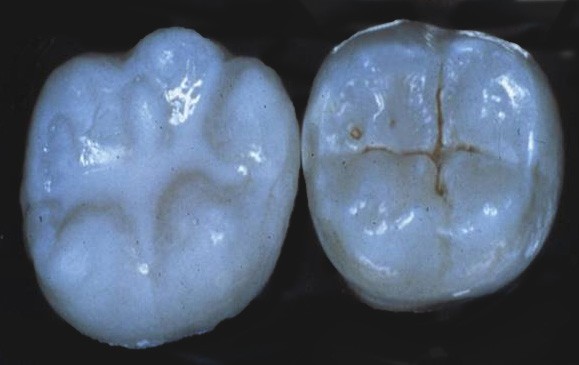Pit and Fissure Sealants
Introduction to Dental Pit and Fissure Sealants
What are dental sealants?
Dental sealants are made of plastic and are applied to the chewing surfaces of the back teeth to prevent decay. The plastic fits into the depressions and grooves (pits and fissures) of teeth. The sealants protect tooth enamel from the bacteria and acids that cause decay.
Why can’t I just brush and floss?
While brushing and flossing help to remove food particles and plaque from smooth surfaces of teeth, toothbrush bristles often can’t reach into the teeth’s depressions and grooves. Sealants protect those areas and prevent food and bacteria from getting in.
Is a needle or freezing required for a dental sealant?
No local anaesthetic is required when placing a sealant in the pits and fissures of a tooth.
How does the dentist apply a sealant?
Your dentist can apply sealants easily, and it takes only a few minutes to seal each tooth. The dentist first cleans the teeth that will be sealed, which may require the use of a dental drill to open the grooves of the teeth and determine if decay is present. Then he or she will roughen the chewing surfaces with an acid solution, which will help the sealant stick to the teeth. The dentist then “paints” the sealant on the tooth. It bonds directly to
the tooth and hardens. Sometimes your dentist will use a special curing light to help the sealant harden.
Aren’t sealants just for kids?
Decay can begin early in life, so dentists usually apply sealants to children’s and teenagers’ premolars and molars to protect them. But sealants can protect adults’ teeth, too. Ask your dentist about sealants for your children or for yourself to see if they would be beneficial.
How long do they last?
As long as the sealant remains intact, the tooth surface will be protected from decay. Sealants hold up well under the force of normal chewing and usually last several years before a reapplication is needed. The risk of decay decreases significantly after sealant application. During your regular dental visits, your dentist will check the condition of the sealants and reapply them when necessary.
Are sealants safe?
Sealants are extremely safe, though some people may have an allergic reaction to the plastic. Talk to your dentist if you or your children have allergies so that he or she can provide the best treatment options. Dental sealants used at Queen’s Park Dental do not contain any Bisphenol A (BPA).
Molar Tooth with a white dental sealant on the biting surface of the tooth and one molar tooth without

Source: Academy of General Dentistry (AGD) which Dr. Murphy is a member of.

